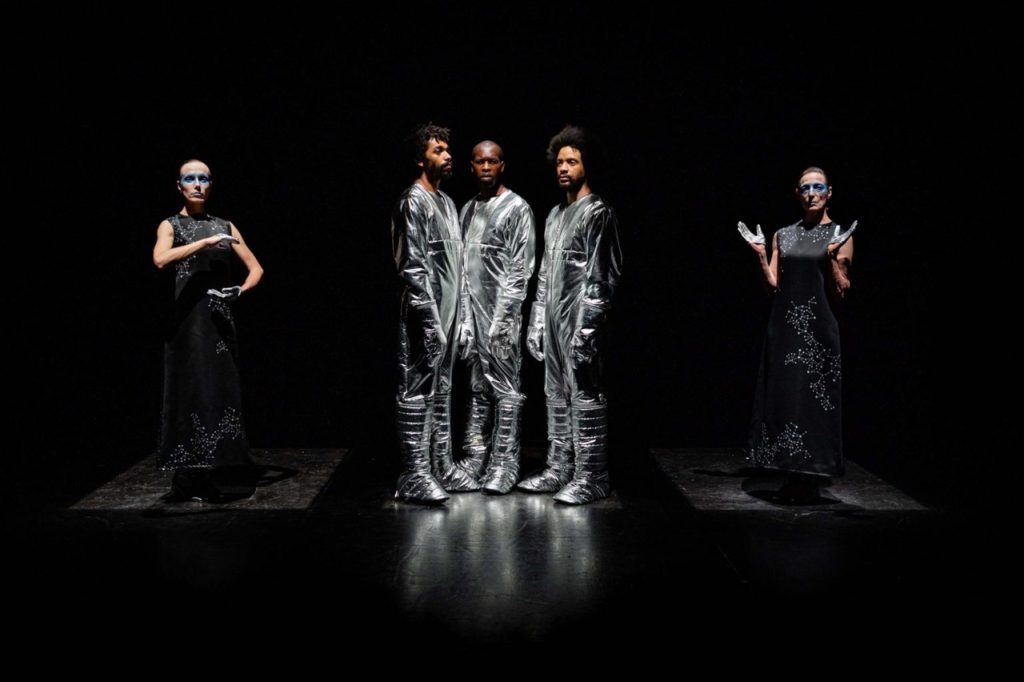This installation and performance constitute the sixth stage of the trans-European project The City Ghettos of Today: Exploring the Memory and Present Day Reality of Migrant Communities in European Cities.
At the heart of the project The City Ghettos of Today is a desire to redefine and reexamine the concept “ghetto” in the context of today’s closed migrant districts. Through artistic creation and sociological research, we aim to create a space in which to examine and discuss the multiple stories emanating from Europe’s migrant “ghettos”. How do we talk about “ghettos” today? Is it possible – and even necessary – to redefine the word in a manner that more accurately reflects the multiple realities that constitute our contemporary urban landscapes? What role do “ghettos” play in constructing a European identity? What factors contribute to phenomena of “ghettoization” in contemporary Europe? What are the dynamics that contribute to the implantation of migrant communities throughout Europe today and how do they connect to the collective memory of Europe’s past?
The City Ghettos of Today entails a series of workshops open to local communities in different European cities – Warsaw, Paris, Bologna, Milan, Helsinki, Berlin and Antwerp. Run by artists and cultural actors, each workshop installment will conclude with an art installation and public debate on the project’s themes in each of the cities listed above. This European collaboration will conclude in Warsaw in December 2014 with a large-scale installation-performance and debate that will bring together materials culled from each of the participating city workshops. The project unites artists, cultural actors, academics and social workers in order to explore the broad themes of “ghetto” and “migration districts” in participating European cities. The City Ghettos of Today reflects the interdisciplinary dimension of the Strefa WolnoSlowa foundation, which combines academic and theoretical methodologies with practices of artistic and cultural creation. Through artistic reflection and intellectual research, this collaborative project seeks to unravel the complex and problematical theme of “migrant ghettos” in contemporary Europe, paying particular attention to various definitions and visions of ghettos within the contexts of Warsaw, Paris, Bologna, Milan, Helsinki, Berlin and Antwerp.
The City Ghettos of Today in Berlin: Uninhabited Island
November 4 – 13, 2014
Uninhabited Island situates The City Ghettos of Today in the Berlin site-specific context of a rapidly changing city, from the “Cinderella” of European capitals back in the 1990s to the present “place to be”. The focus will be placed on the urban and social changes which are currently affecting the city, such as gentrification and the resulting displacement of low-income inhabitants, often including those with a “migration background”. Former immigrant and poor districts often associated with the idea of “ghetto”, like Kreuzberg or Neukölln, have received unprecedented hype and developed into magnets for tourists and real estate investors during the last five years.
Over the course of this, these districts, once the furthest limits of West Berlin and now central districts in the reunified German capital, have been increasingly populated by a new wave of immigrants. These newcomers, primarily from comparatively rich Western countries, active in the creative industries and often using English, not German, as a working language stand in stark contrast both to the pre-war German residents of Kreuzberg and Neukölln as well as the first wave of post-war immigrants, coming primarily from Turkey through a guest worker program established by West Berlin.
How do these distinct groups see themselves today? How do they see each other? Can they even communicate? 25 years after the Fall of the Wall, Berlin is still an island. An island full of existing inhabitants and constantly arriving new inhabitants. An island whose international glamorization and hyping in recent years have radically transformed living conditions in these previously impoverished, primarily migrant districts in the form of unsustainably increasing rental costs. An island that everyone wants to obtain or defend a piece of. The “struggle” for the island will be examined with representatives from these various groups through laboratories and workshops.
The Berlin-based part of the project is organized in cooperation with English Theatre Berlin | International Performing Arts Center, OnElf Theater and Performance Collective, European Alternatives and Tanz der Kulturen e.V.
- Artistic Workshops: Creating Uninhabited Island
Beginning on November 4, the international artistic team of The City Ghettos of Today from Poland, Italy, Finland and France together with the local partners English Theatre Berlin | International Performing Arts and OnElf Theater and Performance Collective will invite an heterogeneous group of participants based in Berlin, old and new Berliners, from Germany and from beyond, to work and reflect on the changing living and social conditions in the city. Starting from the stories and biography of the participants as a representative “sample” of contemporary Berliners and in a provocative relation with one another, a collective, controversial and complex portrait of the city will be created and strategies and desires for a common future will be rehearsed.
The results of this collective undertaking will be presented on Thursday, November 13 at 8:00 pm at English Theatre Berlin | International Performing Arts Center.
Workshops will be led an artistic project team consisting of: Pietro Floridia (Cantieri Meticci, Bologna), Alicja Borkowska (Strefa WolnoSłowa, Warsaw), Daniel Brunet (English Theatre Berlin | IPAC), Elena Basteri, Christian, Willhelm and Johannes Kup (OnElf Theatre and Performance Collective), Mehmet Ballikaya (Tanz der Kulturen), Linda Fahssis (Cie Check Points, Paris), Tomasz Gromadka (Strefa WolnoSłowa, Warsaw), Piotr Mikuć (Strefa WolnoSłowa, Warsaw), Marek Płuciennik (Ptarmigan, Helsinki), Alejandro Olarte (University of Arts of Helsinki – Center for Music and Technology)
- Debate: Gentrification? It’s the Art, Stupid!
When: November 8, 2014, 4:30 pm
Where: English Theatre Berlin | International Performing Arts Center, Fidicinstr. 40, 10965, Berlin
Moderated by sociologist Baris Ulker of Technical University Berlin, Center for Metropolitan Studies, artists, activists and academics will discuss Berlin, gentrification, social and urban change as well as the role of the artist as both catalyst of gentrification and as producer of alternative spaces and counter narratives of the urban and social environment.
Participants: Baris Ülker (Technische Universität Berlin, Center for Metropolitan Studies), Elena Basteri (Onelf Theater and Performance Collective Berlin), Renata Włoch (Sociology Institute of Warsaw University), Daniel Brunet (English Theatre Berlin | IPAC), copy & waste, Michelle Teran, Helga Dressel (Co-curator of the project Haus der 28. Türen),
- Spotlight on the Installation
When: November 13, 2014, 8:00 pm
Where: English Theatre Berlin | International Performing Arts Center, Fidicinstr. 40, 10965, Berlin
Admission to all events is free of charge.
This project is financially supported by the European Commission – Program Europe for Citizens and co-financed by the Evens Foundation

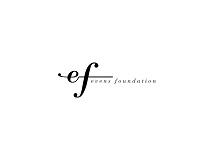
 Olha Mazjupa, born in 1988 in Pidbirzi near Lviv, is a playwright and theater studies scholar. She studied Serbian language and literature at the Ivan Franko University Lviv and graduated with a PhD from the Marie Curie-Skłodowska University in Lublin in theater and literary studies. Her plays have been performed in Lviv, Chust, Sievierodonetsk and Chernivtsi, and she has worked with theatres in Rzeszów and Sosnowiec. In 2017, her play Öko-Ballade won the internation author prize at the Heidelberger Stückemarkts.
Olha Mazjupa, born in 1988 in Pidbirzi near Lviv, is a playwright and theater studies scholar. She studied Serbian language and literature at the Ivan Franko University Lviv and graduated with a PhD from the Marie Curie-Skłodowska University in Lublin in theater and literary studies. Her plays have been performed in Lviv, Chust, Sievierodonetsk and Chernivtsi, and she has worked with theatres in Rzeszów and Sosnowiec. In 2017, her play Öko-Ballade won the internation author prize at the Heidelberger Stückemarkts. Małgorzata Sikorska-Miszczuk is a multi-award winning playwright, librettist and scriptwriter in Poland and abroad. She studied journalism and political science at the University of Warsaw. She is also a graduate of the scriptwriting program at the State School for Film, Theater and TV in Łódź. Recipient of scholarships from CEC ArtsLink in the USA, the Adam Mickiewicz Institute and the Stiftung Genshagen. Author of plays that are performed both in the original and in translation, as well as radio plays, opera libretti, film scripts and plays for children. In 2011, she was invited to the Berliner Stückemarkt.
Małgorzata Sikorska-Miszczuk is a multi-award winning playwright, librettist and scriptwriter in Poland and abroad. She studied journalism and political science at the University of Warsaw. She is also a graduate of the scriptwriting program at the State School for Film, Theater and TV in Łódź. Recipient of scholarships from CEC ArtsLink in the USA, the Adam Mickiewicz Institute and the Stiftung Genshagen. Author of plays that are performed both in the original and in translation, as well as radio plays, opera libretti, film scripts and plays for children. In 2011, she was invited to the Berliner Stückemarkt.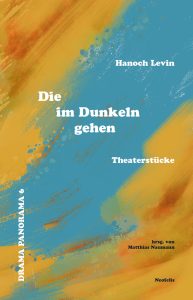
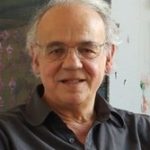 Freddie Rokem is Professor Emeritus at the Department of Theater at Tel Aviv University, where he was Dean of the Faculty of the Arts (2002–2006) and held the Emanuel Herzikowitz Chair for the Arts of the 19th and 20th Centuries (2006–2016). He has been a guest professor at various universities, such as the Freie Universität Berlin, the Goethe-Universität Frankfurt am Main and the University of Chicago. The following of his books have been published in German translation: Geschichte aufführen. Darstellungen der Vergangenheit im Gegenwartstheater (2012) and TheaterDenken. Begegnungen und Konstellationen zwischen Philosophen und Theatermachern (2017). Rokem also works as a dramaturg and translator.
Freddie Rokem is Professor Emeritus at the Department of Theater at Tel Aviv University, where he was Dean of the Faculty of the Arts (2002–2006) and held the Emanuel Herzikowitz Chair for the Arts of the 19th and 20th Centuries (2006–2016). He has been a guest professor at various universities, such as the Freie Universität Berlin, the Goethe-Universität Frankfurt am Main and the University of Chicago. The following of his books have been published in German translation: Geschichte aufführen. Darstellungen der Vergangenheit im Gegenwartstheater (2012) and TheaterDenken. Begegnungen und Konstellationen zwischen Philosophen und Theatermachern (2017). Rokem also works as a dramaturg and translator. Antje Thoms studied applied theater studies in in Gießen and was then an assistant director at the Niedersächsisches Staatstheater Hannover. There she worked with directors including Sebastian Nübling, Luk Perceval and Jossi Wieler. Since 2003, she has worked as a freelance director and writer, and in 2007 founded the independent Zürcher Theaterformation Trainingslager with the writer Jens Nielsen and actor Dominique Müller. From 2014/15 to 2021/22, Antje Thoms was house director at the Theater Göttingen and starting in the 2022/23 season is director of drama at the Theater Regensburg.
Antje Thoms studied applied theater studies in in Gießen and was then an assistant director at the Niedersächsisches Staatstheater Hannover. There she worked with directors including Sebastian Nübling, Luk Perceval and Jossi Wieler. Since 2003, she has worked as a freelance director and writer, and in 2007 founded the independent Zürcher Theaterformation Trainingslager with the writer Jens Nielsen and actor Dominique Müller. From 2014/15 to 2021/22, Antje Thoms was house director at the Theater Göttingen and starting in the 2022/23 season is director of drama at the Theater Regensburg.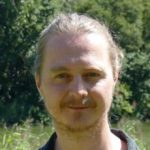
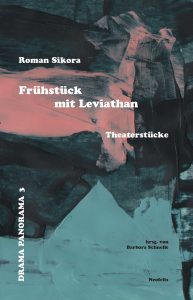
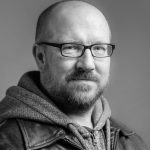 After completing his training, Roman Sikora worked as an electrician and mechanic at the steelworks in his hometown of Třinec, before he studied directing and dramaturgy at the Janáček Academy for Music and the Performaing Arts in Brno. Today he works as a freelance playwright and theater critic, translates from Polish (e.g. Małgorzata Sikorska-Miszczuk) and teaches playwriting at the faculty of theater at the the Academy of Musical Arts in Prague. Sikora’s plays have been translated into many languages and performed internationally.
After completing his training, Roman Sikora worked as an electrician and mechanic at the steelworks in his hometown of Třinec, before he studied directing and dramaturgy at the Janáček Academy for Music and the Performaing Arts in Brno. Today he works as a freelance playwright and theater critic, translates from Polish (e.g. Małgorzata Sikorska-Miszczuk) and teaches playwriting at the faculty of theater at the the Academy of Musical Arts in Prague. Sikora’s plays have been translated into many languages and performed internationally.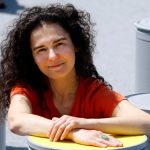 Barbora Schnelle works as a freelance translator, theater critic and culture manager. In 2009, with Antje Oegel, she founded the project Drama Panorama: Forum für Übersetzung und Theater. In 2014 she founded the festival of contemporary Czech theater Ein Stück: Tschechien in Berlin, which she has run and curated since then.
Barbora Schnelle works as a freelance translator, theater critic and culture manager. In 2009, with Antje Oegel, she founded the project Drama Panorama: Forum für Übersetzung und Theater. In 2014 she founded the festival of contemporary Czech theater Ein Stück: Tschechien in Berlin, which she has run and curated since then.